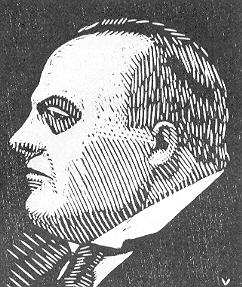
Edward Winter
An article by Kasparov on pages 104-105 of the 8/2005 New in Chess begins:
‘Botvinnik first captured the highest title in 1948, in the first true world championship event organized under FIDE – discounting their earlier amateur titles that were given little significance by contemporaries and even less by history. Prior to World War II FIDE failed to interest the champions, Alekhine publicly scoffing at Bogoljubow’s FIDE title.’
Page 130 of Bogoljubow – The Fate of a Chess Player by S. Soloviov (Sofia, 2004) states:
‘Efim Dmitrievich was invited to Holland in the spring [of 1928] for a match with Euwe. The idea was to determine the new FIDE world champion.
... the first world championship for amateurs was played in Paris in 1924 and the Latvian master Mattison won it. He was not universally acknowledged at all and FIDE decided to organize another competition – a match for the title of FIDE champion. ... There were not many people, though, who believed that Euwe had any chances of success. Still, he was leading after six games and Bogoljubow only managed to win the match at the end because of two wins in a row: +3 –2 =5. FIDE’s fifth Congress awarded him the title “Champion of FIDE”. Well, Bogoljubow was also not accepted as a true world champion then either.’

Efim Bogoljubow (woodcut by Erwin Voellmy)
Myths have grown up about the ‘FIDE champion’ affair, and in particular there are no grounds for describing Bogoljubow as ‘FIDE world champion’, a term which the Federation did not use. An overview of what happened was provided in C.N. 1967 (see pages 209-210 of Kings, Commoners and Knaves), and now we examine the matter in greater detail.
At its Congresses in 1925 and 1926 FIDE expressed a desire to become involved in the world championship, on the basis of the London Rules of 1922 (which had been signed by Capablanca, Rubinstein, Maróczy, Réti, Alekhine, Bogoljubow, Tartakower and Vidmar). FIDE accepted the Rules in principle, as a basis for the world championship being held under its auspices, but declared itself unable to provide the funds required; believing the financial provisions impracticable, it called upon Capablanca to come to an agreement with the leading masters to revise them. Below is the corresponding part of Resolution XI, which was passed at the FIDE Congress in Budapest in 1926 and appeared on pages 8-9 of the minutes:
‘L’Assemblée Générale ...
Constatant, qu’en principe, l’Assemblée Générale accepte les dispositions du protocole de Londres comme pouvant servir de base aux épreuves pour le Championnat du Monde sous les auspices de la FIDE; que toutefois la FIDE n’est pas disposée à dépenser dans ce but la somme fixée par le protocole de Londres;
Que d’ailleurs le protocole de Londres ne semble pas praticable sur ce point, et formerait un obstacle permanent à la rencontre pour l’honneur suprême des échecs;
Invite M. Raoul-José Casablanca [sic] à s’entendre avec MM. les grands Maîtres pour réviser sur ce point les conditions pour le Championnat du Monde.’
Page 5 of the 1926 minutes referred to a distinct matter: the Federation’s decision to introduce the official championship of FIDE (‘... décide d’autre part d’instituer le championnat officiel de la FIDE’), but in a report on FIDE’s Congress in London (July 1927) on pages 138-139 of the September 1927 Schweizerische Schachzeitung J.L. Ormond indicated that FIDE was biding its time over the ‘FIDE championship’ until Capablanca had played his match against Alekhine for the world championship:
‘La question du championnat de la FIDE reste en suspens, en attendant le match Capablanca-Alekhine pour le championnat du monde à Buenos Aires en septembre prochain.’
In a separate section on the same page Ormond mentioned other plans by FIDE, e.g. to hold in 1928 ‘un tournoi individuel pour le championnat amateur de la FIDE (tenant: Mattison) ouvert à un seul représentant par fédération’. The earlier such event had been held in 1924, and was called the ‘tournoi international d’amateurs à l’occasion de la VIIIe Olympiade’ in the report on pages 169-171 of the July 1924 La Stratégie.
The second tournament took place in The Hague in July and August 1928, being described on page 328 of the September 1928 BCM as ‘the second Olympic Chess Tournament’. It was won by Euwe, who thereby became ‘Olympic individual champion’, in succession to Mattison.
The Netherlands had also been the venue, a few months previously, for a match between Euwe and Bogoljubow which page 132 of the May 1928 Deutsche Schachzeitung described as being for the championship of the World Chess Federation (‘um die Meisterschaft des Weltschachbundes’). Page 238 of the June 1928 BCM commented:
‘It has been stated that this victory entitles the winner to be regarded as the official (FIDE) candidate for a challenge match with the world champion. As the FIDE annual meeting of delegates is not until August next, at the Hague, we fail to see how this can have been decided.’
Below, for the record, is the complete text in the FIDE minutes (The Hague, 1928) with respect to the ‘Championnat de la FIDE’:
‘L’A.G. [Assemblée Générale] vu les décisions des Congrès de Budapest et de Londres, approuve l’attitude du Comité Central qui a adopté le premier match Bogoljubow-Euwe comme le premier match pour le titre de Champion de la FIDE.
Le félicitant de [sa] victoire, elle reconnaît le Maître E. Bogoljubow comme le premier Champion de la FIDE.
Mr Wahltuch propose de dresser la liste réglementaire des quatre candidats pour le championnat de la FIDE (art. 5 Règlement des Epreuves).
Mais l’A.G. s’abstient pour cette année de l’établissement de cette liste, se réservant toute décision ultérieure à ce sujet.’
In short, the General Assembly approved the Central Committee’s decision to adopt the Bogoljubow v Euwe contest as the first match for the title of FIDE champion. The British delegate, Victor Wahltuch, proposed that the required list of four candidates for that title should be drawn up, but the General Assembly decided to defer the matter.
Nothing was said about Bogoljubow possibly becoming the world championship challenger by dint of his victory over Euwe.
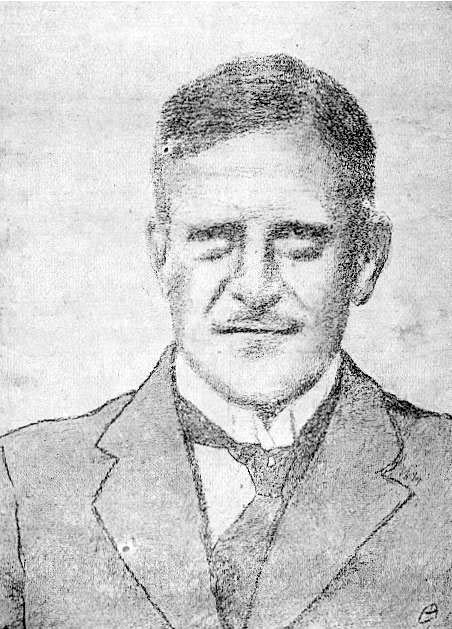
Alexander Rueb
The FIDE President, the Dutchman Alexander Rueb, was absent from the Congress in The Hague but had submitted a lengthy report dated June 1928 which included detailed background information on the genesis of the FIDE championship:
‘Entre l’institution du championnat du monde et de celui de la FIDE il y a de la connexité. Dès les commencements en 1925 l’Assemblée Générale a été d’opinion que derrière l’épreuve suprême pour le championnat du monde il pouvait y avoir dans l’enceinte de la FIDE un championnat général, de structure plus simple, mais régulier et de valeur durable.
Le paragraphe trois du Règlement des Epreuves contient la définition complète de cette institution.
Pour éviter que le Championnat de la FIDE restât lettre morte j’ai demandé et obtenu à l’Assemblée Générale de Budapest l’autorisation pour le Comité Central d’arranger le premier match pour ce championnat, ou bien, s’il se présentait un match dû à une autre initiative, d’accepter cette épreuve comme épreuve de la FIDE, si elle répondait à certaines exigences. Mes efforts en 1926 pour arranger un match entre MM. Alekhine et Bogoljubow ont rencontré des obstacles insurmontables; mais au mois d’avril de cette année s’est présentée une excellente occasion dans le match Bogoljubow-Euwe. Avec le consentement explicite de Messieurs Rees et Nicolet j’ai fait savoir aux deux concurrents, avant le commencement de la lutte, qu’avec leur consentement elle serait comptée comme une épreuve pour le championnat de la FIDE. Mon choix était fondé sur la haute considération dont jouissent les deux adversaires, et le niveau des parties jouées m’a semblé le justifier tout à fait. J’ai pu avec une sympathie particulière souhaiter la bienvenue comme premier Champion de la FIDE à Monsieur Eugène [sic] Bogoljubow, qui est sorti de la lutte avec une petite avance. C’est maintenant à l’Assemblée Générale de donner son approbation aux démarches du Comité Central et de procéder selon le règlement à la liste de quatre candidats officiels au titre.
Dans la presse et même chez des personnages officiels j’ai rencontré de l’étonnement et de l’incompréhension à propos du match Euwe-Bogoljubow, en rapport avec le titre de champion de la FIDE. La responsabilité en retombe sur moi, puisque je suis chargé de l’Administration du Bureau de la FIDE ...’
To summarize this report by Rueb: Already in 1925 the General Assembly considered that in addition to the world championship there could be, within FIDE, a general championship. In 1926 Rueb was authorized by the General Assembly to arrange the first match for the FIDE championship, or to accord that status to any suitable match organized by another party. That same year he encountered insurmountable obstacles in trying to set up a match between Alekhine and Bogoljubow, but in April 1928 an excellent opportunity arose with the Bogoljubow v Euwe match. With the agreement of two senior FIDE officials, L.P. Rees and M. Nicolet, Rueb approached Bogoljubow and Euwe in advance of their match to propose that it be played for the FIDE championship. Rueb invited the General Assembly to approve his course of action and to draw up a list of four candidates for the FIDE title. Finally, he observed that in the press, though among officials too, astonishment and incomprehension had been expressed at FIDE’s action over the Bogoljubow v Euwe match and the ‘FIDE champion’ title. As the person in charge of administering the FIDE office he assumed responsibility for what had been done.
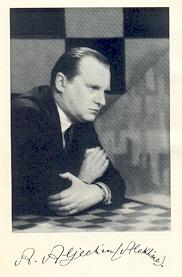
Alexander Alekhine
Alekhine, the reigning world champion, attended part of the 1928 Congress and, as recorded in the minutes, agreed to place future matches for the world title under the auspices of FIDE, although any match with Capablanca should be under the same conditions as in Buenos Aires, 1927. The General Assembly approved this position and decided to form a commission under Rueb to modify the London Rules. The following, in addition to Alekhine, would be asked to make up the commission: Pierre Vincent, Walter Robinow, Jan Bedrníček, Ossip Bernstein and Sir George Thomas.
A resolution declared that given the formation of the commission and since, furthermore, it was desired to combine the world championship and the FIDE championship in the near future, no further discussion on procedures would be undertaken at that stage. The full text of this resolution was:
‘Championnat de la FIDE
Vu qu’une commission a été nommée pour examiner les conditions à proposer pour le Championnat du Monde, et le désir d’arriver à confondre dans un prochain avenir le Championnat du Monde et le Championnat de la FIDE,
l’Assemblée Générale suspend toute discussion qui aurait dû être entreprise conformément au Règlement de la FIDE pour cette épreuve;
renonce pour la même raison à en examiner la modification, le statu quo continuant d’exister (unanimité).’
The minutes of subsequent FIDE Congresses recorded that the commission never met. In any case, by the time of the 1929 Congress in Venice, which Alekhine also attended, a world championship match was underway (neither under the auspices of FIDE nor in accordance with the London Rules) between Alekhine and Bogoljubow. No more was heard of the idea of a FIDE champion at that time.
Rueb was under great strain in 1928. The detailed report on the Congress by Erwin Voellmy on pages 137-143 of the September 1928 Schweizerische Schachzeitung referred to Rueb’s absence through serious illness, as well as his strong desire to resign as President. It is notable that Voellmy made no mention at all of the ‘FIDE championship’ matter.
To return to Kasparov’s comments in New in Chess, is it fair to assert that ‘FIDE failed to interest the champions’, given that Capablanca, Alekhine and Euwe were, at various times, all closely involved in efforts to bring the world championship title under the aegis of FIDE? As has been mentioned above, Alekhine attended the FIDE Congresses in both 1928 and 1929, but where exactly is he to be found ‘publicly scoffing at Bogoljubow’s FIDE title’?
On the other hand, Kasparov’s comment about the insignificance of the ‘FIDE champion’ title can hardly be disputed. Rueb and other FIDE officials really should have anticipated that it would prompt ‘astonishment and incomprehension’.
(4056)
Now, some comments by Alekhine on the subject can be quoted, from page 24 of volume one of A.J. Gillam’s production, Argentinian Scrapbook of Chess Columns (Nottingham, 1992). In a lengthy article in the newspaper La Nación (issue undated, but the article was headed ‘Paris, June 1928’) Alekhine discussed that year’s match between Bogoljubow and Euwe. His remarks included the following (in our translation from the Spanish):
‘However, the interest aroused by the match, virtually everywhere, is not limited to the purely chess-related aspects. Of no less importance would seem to be its sporting consequences, because of a decision by the FIDE (International Chess Federation) office, which decreed, when the match began, that the winner would be proclaimed FIDE champion.
I have no personal interest in the question of that title and can therefore, with all the more sincerity, express my astonishment not at the creation of the title, which, in short, can harm nobody, and can, rather, enhance the slightly compromised prestige of the organization introducing it; yet in truth we cannot pass over in silence the form chosen for disputing the title.
Why was Euwe chosen, when he has not had a single real success in international tournaments worthy of that name, and why was consideration not given to Nimzowitsch, Vidmar, Rubinstein, Tartakower, Réti, Marshall, Spielmann and tutti quanti? Is the sole reason the fact that the President of FIDE is of the same nationality as the opponent chosen for Bogoljubow? Certainly I would not wish to believe so ... But the FIDE office should not forget that after its series of gaffes following the recent world championship it needs to be particularly prudent, so as to avoid compromising in a definitive manner, before the entire world, the institution that it represents.’
(5649)
Christian Sánchez (Rosario, Argentina) reports that Alekhine’s article appeared on page 3 of section 2 of La Nación, 1 July 1928.
(5654)
With regard to the 1928 match between Bogoljubow and Euwe for the FIDE championship, C.N. 4056 quoted from an article by Kasparov on pages 104-105 of the 8/2005 New in Chess:
‘Prior to World War II FIDE failed to interest the champions, Alekhine publicly scoffing at Bogoljubow’s FIDE title.’
A passage can now be added from page 16 of the Observer, 27 May 1928, in a report on the Scarborough congress:
‘Dr and Madame Alekhine arrived at the end of play. Dr Alekhine states that a return match with Capablanca for the world championship is problematical. He has received no reply to the last letter, in which he protested against Capablanca’s proposal to change the match conditions.
Asked his opinion on the title of official champion of the International Chess Federation recently awarded to Bogoljubow, he laughingly said he thought it an excellent arrangement, but had no bearing on the world championship title.’
The text was quoted on pages 301-302 of the Chess Amateur, July 1928.
(8505)
An exchange between Max Euwe and Kurt Richter which was quoted on page 35 of the Schweizerische Schachzeitung, March 1948:
Euwe: ‘When the championship negotiations reached an impasse, FIDE proposed organizing a match between Reshevsky and me for the championship of the Federation, but not for the world title. Once the impasse had been resolved, that spelled the end of FIDE’s plan.’
Richter: ‘Indeed, master, and that was no misfortune. A FIDE championship coming now on top of the world championship – what a source of confusion and rivalry that would have been in the chess world, the organization of which is already such a problem.’
(Kingpin 2001)
An article by Fritz Gygli and Jean-Charles de Watteville on pages 35-36 of the March 1948 Schweizerische Schachzeitung:
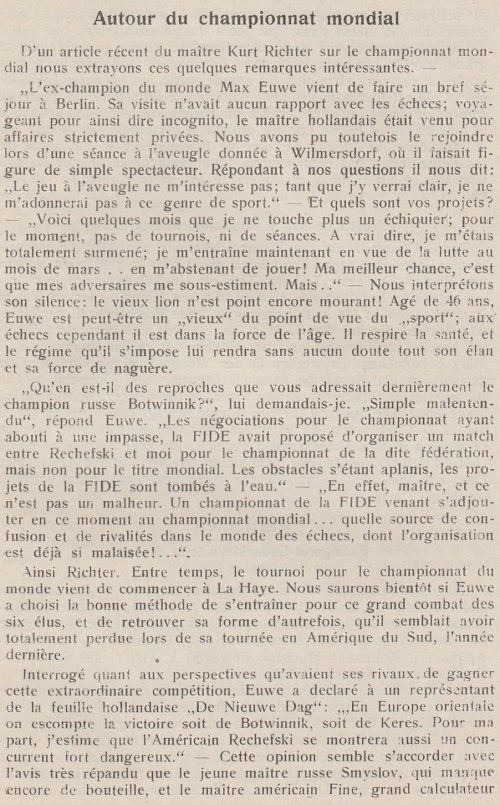
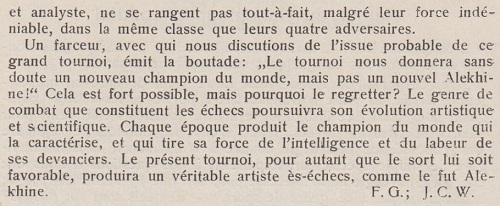
Below, courtesy of Alan McGowan (Waterloo, Canada), is Kurt Richter’s earlier article, on pages 3-4 of Caissa, 2 January 1948:
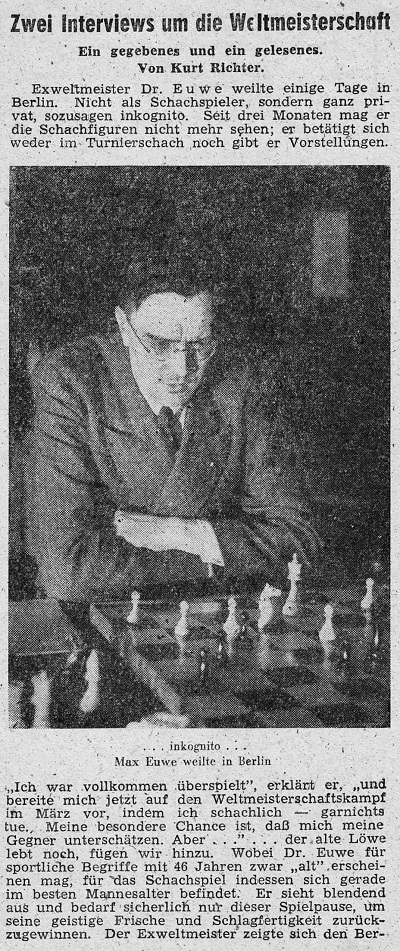
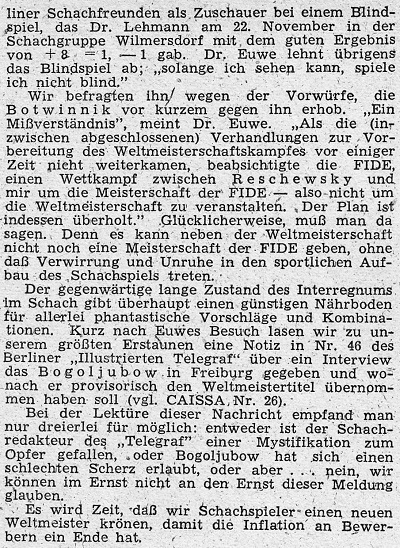
(9100)
To the Chess Notes main page.
To the Archives for other feature articles.
Copyright: Edward Winter. All rights reserved.